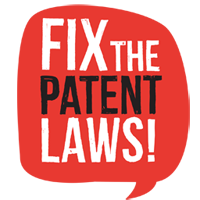 [Posted on FixthePatentLaws.org (Link)] On 24 April 2013, Minister of Trade and Industry Rob Davies stated that South Africa’s new intellectual property (IP) policy would not be released for public comment any time soon. This starkly contrasts with a number of promises in the past two years, by both the Minister and officials in the Department of Trade and Industry (DTI), that the release of the DTI-drafted policy is imminent.
[Posted on FixthePatentLaws.org (Link)] On 24 April 2013, Minister of Trade and Industry Rob Davies stated that South Africa’s new intellectual property (IP) policy would not be released for public comment any time soon. This starkly contrasts with a number of promises in the past two years, by both the Minister and officials in the Department of Trade and Industry (DTI), that the release of the DTI-drafted policy is imminent.
South Africa’s patent laws do not include a number of provisions allowed for under international law that can facilitate access to medicines. In this regard we lag behind other developing countries, such as Brazil and India, in using legal safeguards in the interest of public health. According to earlier comments from the DTI, the department was developing a national IP policy that would lay the foundation for legal reform, and write such public health provisions into South African national law.
However, after recent public comments by Minister Davies, the future of the IP policy appears uncertain. Minister Davies was speaking at a public forum on 24 April 2013 in Cape Town, hosted by the Centre for Conflict Resolution. When asked by a TAC representative when the policy would be made publically available, Davies said he could not give “any comfort that this [policy] is coming out soon”. He further stated that the DTI would be “having quite a thorough relook” and going “back to some fairly solid basics” in drafting South Africa’s IP legislation.
These comments suggest that no progress has been made on the proposed policy in the last two years, despite public pressure and various promises made by the DTI, including the following:
- As far back as September 2011 Minister Davies wrote a letter to TAC and MSF in response to a query regarding South Africa’s intellectual property legislation. The Minister’s letter stated that, “The Government is developing an Intellectual Property Policy (IP Policy) which will also address access to medicines and public health issues. This IP Policy will ensure consistency between our national policy and our engagement at the international level with respect to all IP matters. The IP Policy will also establish a framework for legislative reform across all areas of the IP policy to ensure a consistent approach that contributes positively to the economic and social interest of South Africa.”
- During May 2012, representatives of MSF met with the DTI and were informed the IP policy would be released for public comment in June/July 2012. July passed and the policy was not made available for public comment.
- On 23 October 2012, TAC and MSF hosted a meeting to examine IP legislation in South Africa. Members of the DTI were invited to attend, and spoke at the meeting. Mr MacDonald Netshitenzhe, Chief Director of Policy and Legislation at the DTI, informed the meeting participants that the IP policy would be submitted to Cabinet on 5 December 2012. This would be followed by a three-month period of public consultation where submissions from the public regarding the policy would be accepted.
- When the DTI failed to meet its December 2012 deadline, TAC and MSF were informed that the policy would be submitted to Cabinet and released for public comment during February 2013.
- On 26 February 2013, TAC and MSF picketed at the Africa IP Forum, interrupting Minister Davies speech to ask why the policy had not yet been released. Minister Davies assured the picketers that the policy was in its final stages and would be released “soon”.
- Two days before the Minister’s most recent statements, a Reuters article published on 23 April 2013 quoted Mr Netshitenzhe as saying the overhaul of IP legislation would improve access to medicines by making it more difficult for pharmaceutical companies to obtain patents and keep prices high. This suggested the Ministry was making progress in developing its policy position.
Last week’s abrupt backtrack by the Minister has finally ruptured our faith in the DTI’s policy development process. Our concerns are further affirmed by the lack of attention given to IP issues in the DTI’s recently-published Annual Performance Plan. These developments bring into question the DTI’s commitment to patent law reform.
Given that the DTI has publicly stated that reforms of the IP legislative framework would improve access to medicines, the DTI is obliged in terms of section 27 of the Constitution to take all reasonable measures to realise the right to health care services, which includes the right to access medicines. The DTI is therefore obliged to proceed with the finalisation of the IP policy without undue delay. Almost two years after the DTI indicated that it was undertaking this process, it is not enough to state that it is “going back to basics”.
The DTI has also acted dismissively in its engagement with civil society and has failed to keep its promises to the South African people. Continually delaying reform that would improve access to life-saving medicines is unacceptable, and demonstrates the DTI’s disregard for its Constitutional obligations.
The Treatment Action Campaign and Médecins Sans Frontiéres will continue to campaign ‘to ensure that all organs of state fulfill their obligations in terms of the constitutional right to health’.




